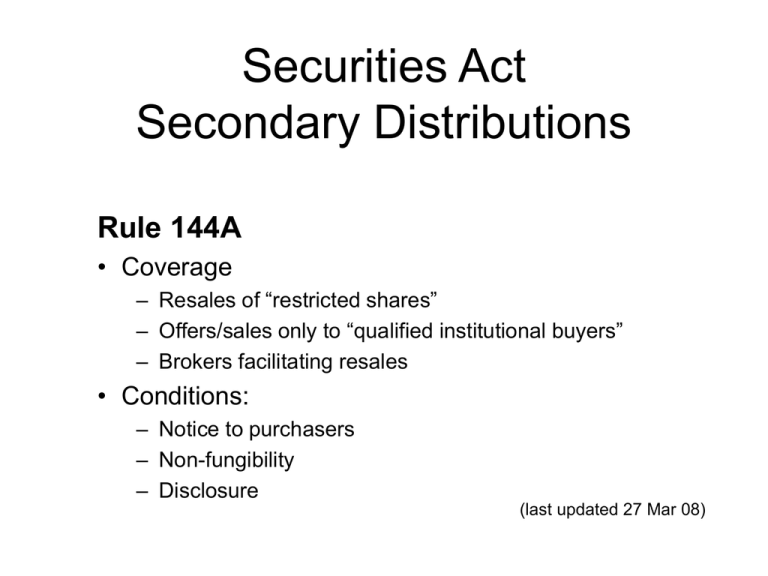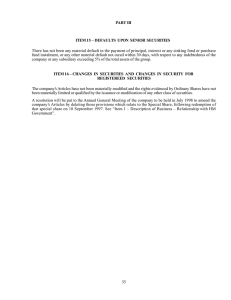Securities Act Secondary Distributions Rule 144A • Coverage
advertisement

Securities Act
Secondary Distributions
Rule 144A
• Coverage
– Resales of “restricted shares”
– Offers/sales only to “qualified institutional buyers”
– Brokers facilitating resales
• Conditions:
– Notice to purchasers
– Non-fungibility
– Disclosure
(last updated 27 Mar 08)
Practitioner’s Query
Certain "Offered Warrants" (among other
securities) are registered on an S-3 "for
resale" by Selling Holders. Selling Holder
"A" resells Offered Warrants to Selling
Holder "B“ – a possibility not mentioned in
the prospectus.
Selling Holder "B" is part of control group.
Hence, these are control securities in B's
hands even though resale restrictions were
supposedly "cleansed" by the resale
registration.
Is current registration useless if B resells?
Must transfer agent place a restrictive
legend upon the warrant certificates
delivered to B?
Am I missing something here? Or is it possible
that the resale registration also covers the
resale by B?
Patrick Daugherty
seclawyer@aol.com
Patrick Daugherty
partner Foley & Lardner {}
Best Lawyers in America
America's Leading Business Lawyers
("top of the class for capital raising”)
What is a “Rule 144A offering” ….
Institutional
Investor
Broker
Institutional
Broker
Investor
Institutional
Broker
Investor
Institutional
Investor
Broker
Institutional
Investor
Trading market
Firm-commitment
underwriting
Best-efforts
underwriting
Underwriter
Underwriter
Purchaser
Restricted
securities
Issuer
§ 4 Exempted transactions
The provisions of section 5 shall not
apply to-(1) transactions by any person other than
an issuer, underwriter, or dealer.
(2) transactions by an issuer not
involving any public offering.
§ 2(a)(11) Definitions
The term "underwriter" means any
person who has purchased from an
issuer with a view to, or offers or sells for
an issuer in connection with, the
distribution of any security … As used in
this paragraph the term "issuer"
shall include, in addition to an issuer,
any [control person].
Rule 144A
(b) Sales by persons other than issuers or
dealers.
Any person, other than the issuer or a dealer,
who offers or sells securities in compliance
with the conditions set forth in paragraph (d) of
this section shall be deemed not to be
engaged in a distribution of such securities
and therefore not to be an underwriter of such
securities …
(c) Sales by Dealers.
Any dealer who offers or sells securities in
compliance with the conditions set forth in
paragraph (d) of this section shall be deemed
not to be a participant in a distribution of such
securities within the meaning of section
4(3)(C) of the Act and not to be an underwriter
…, and such securities shall be deemed not to
have been offered to the public within the
meaning of section 4(3)(A) of the Act [statute].
Rule 144A
(d) Conditions to be met.
(1)
(2)
(3)
(4)
securities offered/sold only to QIB or
reasonably believed to be QIB
seller (and broker) take reasonable steps
to ensure that purchaser aware relying on
Rule 144A
securities not of same class as securities
listed on US stock exchange or Nasdaq
for non-reporting issuer, exempt foreign
issuer, or foreign government, Rule 144A
holders and prospective purchasers can
obtain from issuer, upon request:
–
“very brief” statement about issuer
and business
–
issuer's most recent balance sheet,
P&L and retained earnings
statements for last 2 fiscal years
Some hypotheticals …
(4 hypotheticals and thought problem)
Hypotheticals #1-4
Island Tours wants to raise additional
capital to expand its operations
internationally to provide tours in
Aruba and the Maldives.
Island Tours’ common stock has
traded on Nasdaq since its IPO
three years ago. Skipper, the CEO
of Island Tours, does not want to
expose the company (or himself) to
potential § 11 liability from the
offering.
Hypothetical #1
Island Tours proposes to sell $50
million of a new class of
preferred stock to about ten
large mutual funds. Island Tours
cold calls 100 mutual funds
(assume that these are QIBs) as
potential purchasers and
provides each mutual fund with
some basic information on Island
Tours and three years worth of
audited financials.
Can Island Tours offer and sell to
the mutual funds under Rule
144A?
Hypothetical #2
Island Tours hires Goldbucks
Brothers to act as its selling
agent. Through Goldbucks
Brothers, Island Tours sells $50
million of a new class of
preferred shares to ten
sell
accredited purchasers under
Rule 506.
Lovey, one of the accredited
purchasers, bought $1 million in Accredited Accredited
Lovey
the offering. Two days after the
investor
investor
offering, Lovey cold calls Fidelity
(a qualified institutional buyer)
Reg D
and Fidelity agrees to purchase
Not current
all of her preferred shares in
’34 Act
Island Tours
Island Tours. Is this okay?
filing
Hypothetical #3
Lovey sells to Fidelity three months
after she purchases the
securities from Island Tours.
Fidelity in turn sells the securities to
Vanguard (also a QIB) the next
week.
What if Fidelity sells the securities
Accredited
to the Professor, an academic
with a net worth of $900,000, the investor
next day in a transaction (without
involving a broker)?
Accredited
investor
Lovey
Reg D
Island Tours
Hypothetical #4
Instead of a preferred stock
offering, Island Tours places $10
million of its common stock with
ten accredited investors
(including Lovey). The offering
is exempt under Rule 506.
Lovey wants to sell $1 million of the
common stock she purchased in
the Rule 506 offering to Fidelity
(a QIB) under Rule 144A?
??
Nasdaq
Accredited
investor
Accredited
investor
Lovey
Reg D
Island Tours
Thought problem …
Compare the following …
Ten years ago Fraud-By-Mail (FBM)
placed $5 million common shares
under Rule 505. FBM is a small
non-reporting company with an
active policy of not disclosing any
information to the market or to
broker-dealers.
Last month International Business
Machines (IBM) places $5 million
common shares under Rule 505.
IBM is a large reporting company,
with an active NYSE following.
Which shares are liquid? Does this
make sense?


